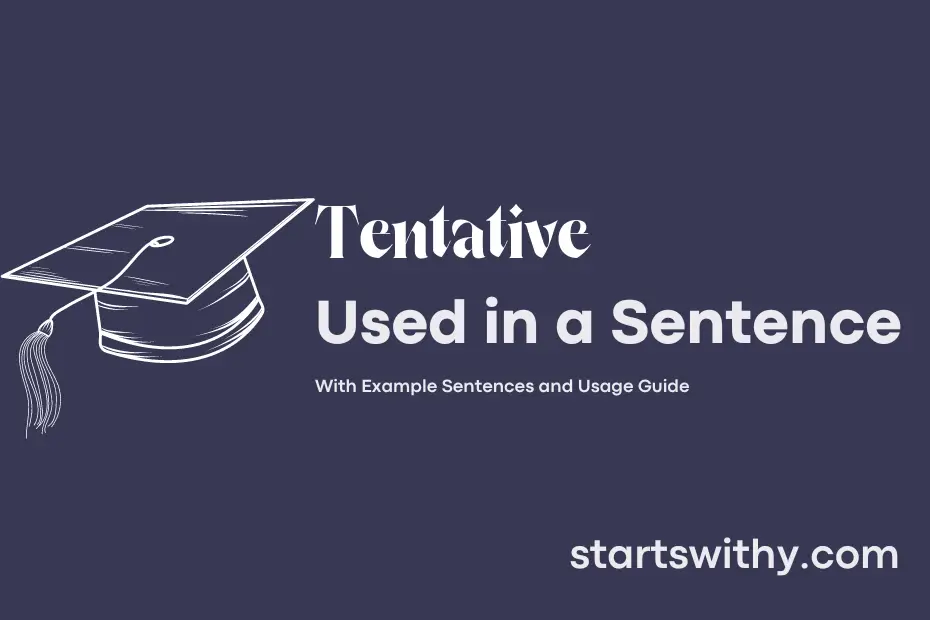Have you ever heard of the word “tentative” and wondered what it means? To put it simply, a tentative action or decision is one that is uncertain or not firmly established. It carries a sense of hesitancy or caution.
In practical terms, a tentative plan or statement is subject to change, often depending on further information or confirmation. This flexibility allows for adjustments and refinements as needed. Let’s delve deeper into the concept of being tentative and how it plays a role in various aspects of our lives.
7 Examples Of Tentative Used In a Sentence For Kids
- We will be having a tentative picnic next week.
- The time for our tentative school assembly is 10 am.
- Our field trip to the zoo is still tentative.
- The date for the class party is tentative.
- The book fair schedule is tentative.
- Our sports day is currently tentative.
- The guest speaker’s visit is tentative.
14 Sentences with Tentative Examples
- I am tentative about choosing my major because I am interested in multiple subjects.
- I made a tentative schedule for next semester, but I might need to adjust it based on class availability.
- My friends and I are tentative about starting a study group for the upcoming exams.
- I have a tentative plan to join a club on campus, but I need more information before committing.
- I am tentative about attending the career fair because I am not sure if I am prepared.
- The professor gave us a tentative deadline for the research paper, but it might change depending on our progress.
- I am tentative about applying for an internship abroad because I am not sure if I meet all the requirements.
- My group members and I are tentative about our presentation topic and are considering other options.
- I made a tentative budget for this semester, but I need to track my expenses to see if it is realistic.
- I am tentative about signing up for summer classes because I am also considering an internship opportunity.
- The study abroad program has a tentative itinerary, but it might change based on travel restrictions.
- I am tentative about joining the debate team because I am not confident in my public speaking skills.
- I have a tentative list of grad schools I want to apply to, but I need to research more before finalizing.
- The workshop schedule is tentative, so I need to confirm the dates before registering.
How To Use Tentative in Sentences?
To use “Tentative” in a sentence, first understand that this word conveys the idea of something that is not final or definite, something that is uncertain or hesitant.
Here are some examples of how you can use “Tentative” in a sentence:
- “She gave a tentative answer to his proposal, saying she needed more time to think about it.”
- “The team made a tentative plan to meet next week, but they were not sure about their availability.”
- “His acceptance of the new job offer was tentative, as he was waiting to hear back from another company.”
When constructing a sentence with tentative, make sure that the context suggests uncertainty or hesitancy. This word is often used to describe actions, decisions, plans, or statements that are not yet firm or confident.
Remember to use the word “tentative” appropriately in your sentence while maintaining clarity and coherence. As you become more familiar with its usage, you can start incorporating it into both spoken and written communication effectively. Practice constructing sentences with “tentative” in different contexts to enhance your understanding and usage of the word.
Conclusion
In summary, the use of tentative sentences allows for flexibility in communication by indicating a level of uncertainty or openness to alternate viewpoints. These sentences often include qualifiers like “possibly,” “sometimes,” or “maybe,” providing an opportunity for further discussion or clarification.
By using tentative language, individuals can convey a sense of humility and demonstrate an understanding that knowledge is not always absolute. This can contribute to more effective and respectful communication, encouraging collaboration and mutual learning. Embracing the use of tentative sentences can lead to more nuanced conversations and a greater willingness to explore diverse perspectives, ultimately enriching interactions and fostering mutual understanding.



